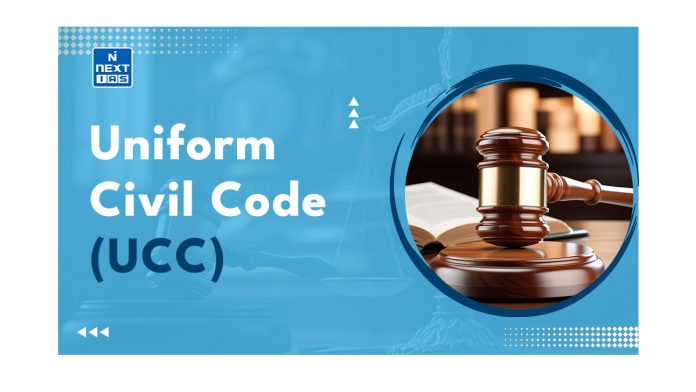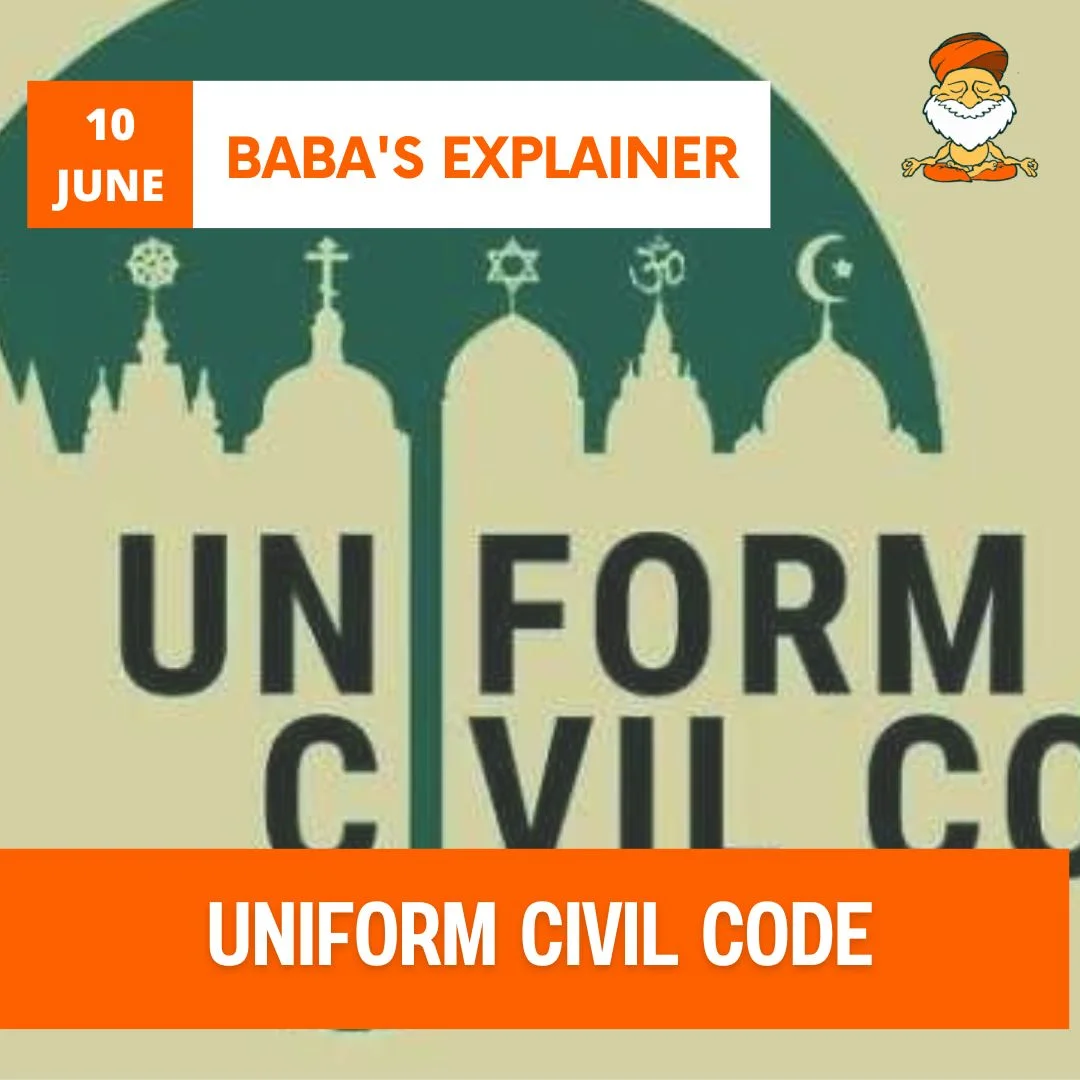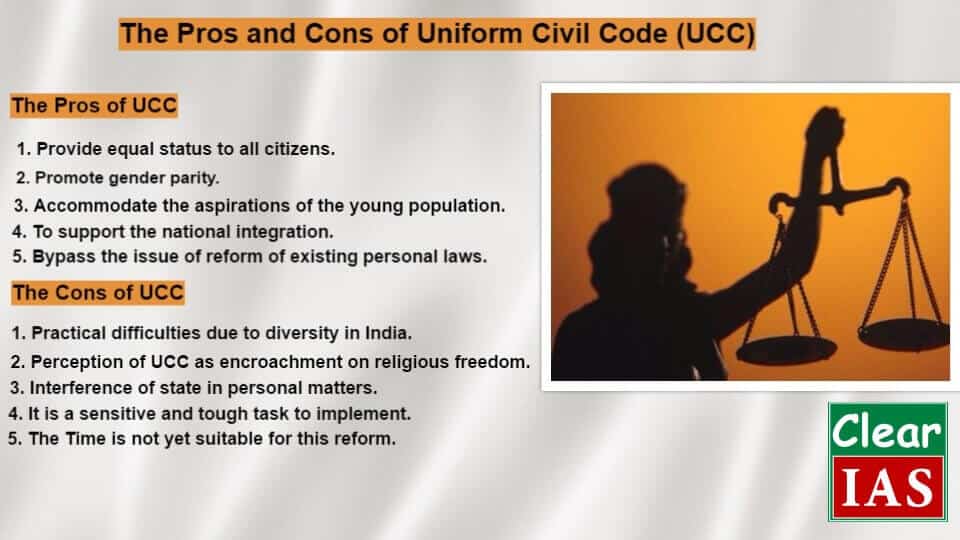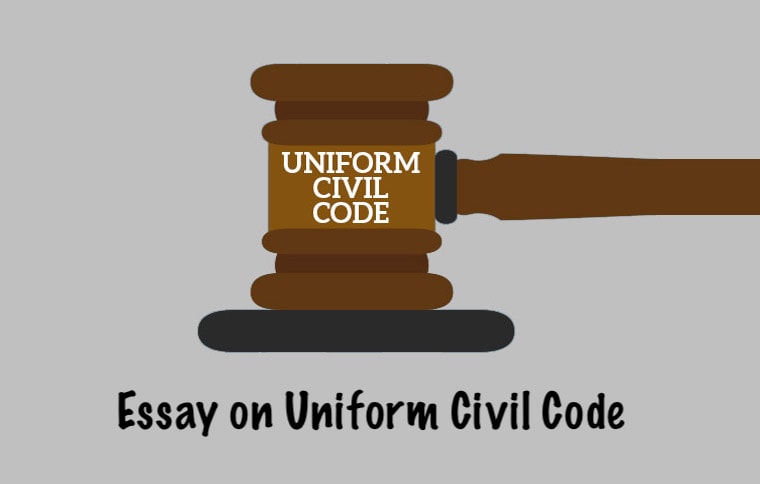

25,000+ students realised their study abroad dream with us. Take the first step today
Meet top uk universities from the comfort of your home, here’s your new year gift, one app for all your, study abroad needs, start your journey, track your progress, grow with the community and so much more.

Verification Code
An OTP has been sent to your registered mobile no. Please verify

Thanks for your comment !
Our team will review it before it's shown to our readers.

- School Education /
Essay on Uniform Civil Code: Background, Challenges, and Benefits

- Updated on
- Apr 19, 2024

The Uniform Civil Code was first introduced in November 1948, within the framework of the Indian Constitution. Today, it is listed under Article 44 of the Indian Constitution and is part of the Directive Principles of State Policy (DPSP). The UCC was introduced to create a common law for all religions, castes, and genders in India. Given India’s vast diversity, the UCC was opposed by many. It became a bone of contention among the framers of the Constitution, and even today, it’s a highly debated and politically charged topic in India. Today, we will be discussing an essay on the Uniform Civil Code for students. This essay will cover its background, challenges, benefits to the nation and a positive conclusion.
Table of Contents
- 1 Essay on Uniform Civil Code in 500+ Words
- 2 Background
- 3 Challenges
- 4 Benefits to the Nation
- 5 Conclusion
Essay on Uniform Civil Code in 500+ Words
The Uniform Civil Code is listed under Article 44 of the Indian Constitution. It is a part of the Directive Principles of State Policies, which are not enforceable by law. These policies are meant to guide both central and state governments to make laws for the welfare of all. The UCC talks about one common civil code for everyone.
UCC meant the abolition of personal laws—laws based on scriptures and religious texts. These personal laws regulated almost every aspect of life, such as marriage, divorce, adoption, inheritance, guardianship, etc. A lot of these laws were discriminatory and unfair to minorities and women.
Quick Read: Press Freedom Essay on 500+ Words
The origin of the Uniform Civil Code can be traced back to the Romans, who governed themselves based on a civil law, and not holy texts. So did the Mesopotamians. They followed the code of ‘Ur-Namo’, which is the oldest law code in history.
The US Constitution is another example, where every individual is equal. The UCC was introduced in the Constituent Assembly in November 1948, and it divided the assembly into two different groups; some were in favour, while others were against.
The objective of the UCC was simple: One Nation, One Law. Although the objective was simple, the Constituent Assembly failed to implement UCC. India is a highly diverse country with a population of more than 330 million people.
Quick Read: Essay on Viksit Bharat
Right after independence, there was constant chaos of religions, ethnicities, customs, and social structures. Both Islamic Fundamentalists and Orthodox Hindus opposed the UCC. They wanted Sharia and Shashtras to determine personal laws.
They feared that the UCC would diminish their authority and give it a different term, ‘A Threat to Religious Freedom’ . To challenge the UCC, they warm up to social unrest in the country. DR Ambedkar, the founding father of the Constitution retreated and made the proposal optional. Therefore, UCC was made Article 44 and listed under the Directive Principles of State Policies.
Benefits to the Nation
According to Article 44 of the Indian Constitution, ‘The State Shall Endeavour to Secure for the Citizens a Uniform Civil Code Throughout the Territory of India.’
- The implementation of the UCC will bring uniformity to the county.
- It will uplift women and oppressed religious communities who have been deprived of their rights. Today, Goa is the only Indian state where the UCC is implemented.
- Until 1961, Goa was a Portuguese colony, where they introduced a civil code applicable to everyone in the colony.
- Even Islamic countries like Turkey, Egypt, Jordan, and Morocco have codified personal laws as per their constitutions. Also, Jordan and Egypt have banned triple talaq.
In the 1980s, the UCC once again gained momentum. In the Shah Banu case, she appealed for justice after being divorced by her husband. According to Muslim Law, she was entitled to only 3 months of alimony. The Supreme Court ruled in her favour and Shah Bano was awarded maintenance.
The Supreme Court of India said, ‘A common civil code will help the cause of national integration by removing disparate loyalties to laws that have conflicting ideologies.’
In its 2019 manifesto, the BJP promised the best provisions for different personal laws from different religions.
Quick Read: Essay on My First Journey By Train
The Uniform Civil Code was introduced to unite India into one law. Even after 7 decades of its introduction, it has remained controversial because of its misuse by religious forces and misinterpretation by politicians. Only by building consensus and bringing experts from all communities and faiths together can we ensure its successful implementation.
Ans: The Uniform Civil Code (UCC) aims to bring all personal laws in India under a common law; the civil law. It meant the abolition or limitation of religious laws in India. The UCC is listed under Article 44 of the Indian Constitution. It is a part of the Directive Principles of State Policies, which are not enforceable by law. These policies are meant to guide both central and state governments to make laws for the welfare of all. The UCC talks about one common civil code for everyone.
Ans: The UCC is listed under Article 44 of the Indian Constitution.
Ans: There was immense opposition from different religious communities and the political parties misinterpreted it. It became difficult for the framers of the constitution to implement it, and so it was listed under the DPSP.
Ans: Goa is the only Indian state where the UCC is implemented. Until 1961, Goa was a Portuguese colony, where they introduced a civil code applicable to everyone in the colony.
Popular Essay Topic
For more information on such interesting topics, visit our essay writing page and follow Leverage Edu.
Shiva Tyagi
With an experience of over a year, I've developed a passion for writing blogs on wide range of topics. I am mostly inspired from topics related to social and environmental fields, where you come up with a positive outcome.
Leave a Reply Cancel reply
Save my name, email, and website in this browser for the next time I comment.
Contact no. *

Connect With Us

25,000+ students realised their study abroad dream with us. Take the first step today.

Resend OTP in

Need help with?
Study abroad.
UK, Canada, US & More
IELTS, GRE, GMAT & More
Scholarship, Loans & Forex
Country Preference
New Zealand
Which English test are you planning to take?
Which academic test are you planning to take.
Not Sure yet
When are you planning to take the exam?
Already booked my exam slot
Within 2 Months
Want to learn about the test
Which Degree do you wish to pursue?
When do you want to start studying abroad.
January 2024
September 2024
What is your budget to study abroad?

How would you describe this article ?
Please rate this article
We would like to hear more.
Have something on your mind?

Make your study abroad dream a reality in January 2022 with
India's Biggest Virtual University Fair

Essex Direct Admission Day
Why attend .

Don't Miss Out

Press ESC to close

Uniform Civil Code in India: Suggestions, Challenges and Essay for UPSC Notes
The Uniform Civil Code is based on the idea of one country, one code that applies to all faith groups. Part 4, Article 44 of the Indian Constitution specifically mentions the term “Uniform Civil Code.”
Since the first petition was submitted in 2019 to demand the creation of a UCC to promote national integration and gender equality, justice, and dignity of women, it has become a hotly disputed topic in India. Questions from it can be asked in the IAS Exam in GS-II (Governance), Mains GS-1 (Indian Society), Prelims, and also Essay papers.
This article will give you all the important notes and information about the uniform civil commission in India. The law commission reports behind the uniform code, when it was formed and why it was formed, all the data will be provided here.
Uniform Civil Code in India: UPSC Essay Introduction Paragraph
A Uniform Civil Code indicates that all members regardless of faith, society, will be treated equally under a national civil code that will be applied similarly to all.
They address topics such as inheritance, divorce, adoption, marriage, child support, and property succession. It is founded on the assumption that in modern culture, there is no link between law and religion.
Also Read: Uniform Civil Code: The Complete Guide to Important UPSC Notes
Features Of Uniform Civil Code of Goa
# In Goa, the Uniform Civil commission is a progressive statute that allows for an equitable distribution of income and property between husband and wife, as well as children (regardless of gender).
# Every birth, marriage, and death must be legally recorded. There are numerous provisions for divorce.
# Polygamy and triple talaq are not permitted for Muslims whose marriages are registered in Goa.
# During the course of a marriage, the couple shares all of the property and wealth that each spouse owns or acquires.
# In the event of a divorce, each spouse is entitled to half of the property, and in the event of death, the surviving member’s ownership is halved.
# Parents cannot completely disinherit their offspring. A minimum of half of their assets must be passed on to the children. This inherited property must be divided among the children equally.
Also Read: How to Write an Essay? 9 Tips To Score Better in UPSC Essay Paper
Suggestions for Bringing Up a Uniform Civil Code
The following suggestions must be considered immediately in order to achieve the DPSP’s goals and maintain legal uniformity
# People should be encouraged to have a progressive and open-minded mindset in order to grasp the spirit of the UCC. Education, sensitization and awareness programmes must be implemented to achieve this.
# The Uniform Civil commission should be written with the greatest interests of all religions in mind.
# To maintain uniformity, a committee of distinguished jurists should be formed, and care must be taken not to offend the feelings of any particular group.
# Given the sensitivity of the subject, it is always preferable if the initiative comes from the religious groups involved.
Uniform Civil Code: Historical Perspective (Second Paragraph)
The perspective of the commission comes from the history of colonial times.
Pre-Independence: Colonial Era
# The October 1840 Lex Loci Report emphasised the need and necessity of uniformity in the codification of Indian law, particularly in the areas of crimes, proof, and contract. However, it was also recommended that Muslim and Hindu personal laws be left out of such codification.
# The Proclamation of the Queen of 1859 pledged complete non-interference in religious affairs.
Post-Colonial Era
Famous leaders like Jawaharlal Nehru and Dr. B.R. Ambedkar campaigned for a standard civil code during the constitution’s development.
However, because of religious fundamentalist opposition and a lack of public understanding at the time, they included the UCC in the Directive Principles of State Policy (DPSP, Article 44).
The Hindu Code Bill
Dr B R Ambedkar drafted the bill to modify Hindu laws that legalised divorce, prohibited polygamy, and provided daughters inheritance rights. Despite fierce opposition, a reduced form of the code was passed through four different statutes.
Succession Act
Originally, the Hindu Succession Act of 1956 did not grant daughters any inheritance rights in the family property. They could only beg for a right to food from a Hindu family that lived together. However, on September 9, 2005, an amendment to the Act was passed, which eliminated the difference.
Minority and Guardianship Act
The Hindu Marriage Act
Adoptions and Maintenance Act
Special Marriage Act
It was passed in 1954 and allows legal marriages to take place outside of any religious personal law.
Also Read: What Is the UAPA Act? Here’s All You Need to Know about the Act for the UPSC Exam
Law Commission Report: Uniform Civil Code in India (Third Paragraph)
According to the Law Commission study, the way forward may not be a Uniform Civil commission, but rather the codification of all personal laws so that stereotypes and prejudices in each one can be exposed and tested against the Constitution’s Fundamental Rights.
Merits of Uniform Civil Code
Given below are the merits of the law commission of the UCC or the Uniform Civil Code. The UCC has many advantages because it is a commission for equality, liberty and franchise.
National Integration
A single commission is essential for the protection of India’s most vulnerable citizens (religious minorities and women), as well as the development of solidarity and national unity.
Simplification of Laws
# There are numerous personal laws, such as the Sharia Law, Hindu Code Bill, and others.
# The existence of so many laws leads to complexity, confusion, and inconsistency in the adjudication of personal matters, which can result in delayed or no justice.
# This overlapping of laws will be eliminated by the UCC.
Simplification of the System
UCC will lead to a decrease in litigation originating from numerous personal laws.
Establishing a Secular Nation
# UCC will separate law from religion, which is a very desirable goal in a socialist and secular society.
# Furthermore, it complies with Article 44 of the Directive Principles of State Policy, which is a constitutional duty.
Gender Justice
# Women’s rights are frequently restricted under patriarchal rhetoric by religious regulations.
# UCC will free women from patriarchal oppression and grant them the right to liberty and equality that they deserve.
# UCC would lead to the defeat of divisionist and communal movements in the long run.
Way Forward UCC (Conclusion)
India has a unique mix of Parsi, Muslim, Christian and Hindu personal laws codified. There is no single family-related law for all Indians in a single statute book that is acceptable to all religious faiths that coexist in India. However, the majority of them agree that UCC is unquestionably desirable and would contribute significantly to the building and consolidation of Indian nationhood.
Furthermore, although the United States Constitution endorses the cause of a uniform civil code in Article 44, it should not be misinterpreted as a “common law.”
The term “uniform” refers to the fact that all communities must be governed by the same gender and human equity principles.
Each personal law will be humanised and modernised as a result.
It would imply different personal rules founded on ideals of liberty, fairness, and equality, rather than common law.
Practice Questions for Uniform Civil Code for UPSC
Here are some questions which are asked in the previous papers of UPSC
# What are your thoughts on the Uniform Civil Code? Examine its applicability in a secular country like India, as well as the obstacles to its implementation. (maximum 250 words)
# Examine the elements that may prevent India from implementing a unified civil commission for its inhabitants, as required by the directive principles of state policy.
# On the one hand, there is no necessary link between religion and personal laws, while civil and personal laws are distinct on the other. Discuss the need for a consistent civil commission and the various issues that come with it in this setting.
# Essay Question: In a secular India, a Uniform Civil Code is Required.
Also Read: UPSC Test Question with Answers: Practice Set for UPSC Current Affairs
This article is an essay on the uniform civil code of India and talks about the challenges, suggestions and also the arguments. The aspirants should take down these as important notes, and also form revision notes as bullet points as uniform civil code is a very crucial topic in the UPSC.
It can be asked in current affairs, general studies papers and even as an essay topic. There are many videos that talk about this topic and many debates which give you the perfect idea of what this topic is all about.
Hopefully , this article helped you with all the data and information that you were looking for. What is your opinion on the Uniform Civil Code of India? Drop your explanation in the comments section below.
Also Read: What is Section 66A of the IT Act? Here is All the Information for UPSC Preparation

One Comment
This article has efficiently provided me with the UPSC notes I was searching for. This has detailed information about every relevant thing. How do you guys prepare the notes for UPSC?
Leave a Reply Cancel reply
Save my name, email, and website in this browser for the next time I comment.
Share Article:
About the Author
Amiksha kantam.
Amiksha is a budding Content Writer. A young writer who has written over 250 poems and quotes and also an author of a famous Wattpad novel named “Ma and the Magical Kingdom” and always sets her goals high with her determination like the sky. Her mother is her inspiration and her family is her biggest support. She has her interest in writing, reading novels and craft. She has developed her hardworking and disciplined persona from her mother. She is very out going and loves travelling, trekking and hiking. She believes in the quote “Creativity lies in actions not experience
You might also like

Operation Kaveri UPSC: Let’s Prepare the UPSC Notes for Current UPSC Topic!

UPSC DPA: Let’s Go Through the Complete Guide for the Examination!

PM SVANidhi Scheme UPSC: Let’s Prepare UPSC Notes for This Significant Topic!
Other stories, what are the uniform civil code questions for upsc basic structure and upsc answer formation, climate change essay: step by step guide to ace upsc writing topic.
Forgot your password?
Lost your password? Please enter your email address. You will receive mail with link to set new password.
Back to login

- भाषा : हिंदी
- Classroom Courses
- Our Selections
- Student Login
- About NEXT IAS
- Director’s Desk
- Advisory Panel
- Faculty Panel
- General Studies Courses
- Optional Courses
- Interview Guidance Program
- Postal Courses
- Test Series
- Current Affairs
- Student Portal

- Pre Cum Mains Foundation Courses
- GS + CSAT Pre cum Main Foundation Course
- GS Pre cum Main Foundation Course
- GS + CSAT + Optional
- GS + Optional
- Prelims Courses
- Current Affairs Course for CSE 2025
- CSAT Course
- Current Affairs for Prelims (CAP)-2024
- Mains Courses
- Mains Advance Course (MAC)
- Essay Course Cum Test Series
- First Step — NCERT Based Course
- Optional Foundation Courses
- Mathematics
- Anthropology
- Political Science and International Relations (PSIR)
- Optional Advance Courses (Optional Through Questions)
- Civil Engineering
- Electrical Engineering
- Mechanical Engineering
- Interview Guidance Programme / Personality Test Training Program
- GS + CSAT Postal Courses
- Current Affairs Magazine – Annual Subscription
- GS+CSAT Postal Study Course
- First Step Postal Course
- Postal Study Course for Optional Subjects
- Prelims Test Series for CSE 2024 (Offline/Online)
- General Studies
- GS Mains Test Series for CSE 2024
- Mains Test Series (Optional)
- Paarth PSIR
- PSIR Answer Writing Program
- PSIR PRO Plus Test Series
- Mathematics Year Long Test Series (MYTS) 2024
- Indian Economic Services
- Anubhav (All India Open Mock Test)
- Prelims (GS + CSAT)
- Headlines of the Day
- Daily Current Affairs
- Editorial Analysis
- Monthly MCQ Compilation
- Monthly Current Affairs Magazine
- Previous Year Papers
- Down to Earth
- Kurukshetra
- Union Budget
- Economic Survey
- NIOS Study Material
- Beyond Classroom
Uniform Civil Code (UCC): Meaning, Constitutional Provisions, Debates, Judgments & More

Rooted in the principles of equality, justice, and secularism, the Uniform Civil Code (UCC) has been a long-standing aspiration in India. Recent developments such as the passage of the Uniform Civil Code (UCC) Bill in Uttarakhand have reignited the debates surrounding it. This article of Next IAS aims to explain the meaning of the UCC, related constitutional provisions, its benefits and challenges, and the way forward.
Meaning of the Uniform Civil Code
A Uniform Civil Code (UCC) refers to a common law that applies to all religious communities in personal matters such as marriage, inheritance, divorce, adoption, etc. It aims to replace the different personal laws that currently govern personal matters within different religious communities.
A UCC primarily aims to promote social harmony, gender equality, and secularism by eliminating disparate legal systems based on different religions and communities. Such a code seeks to ensure uniformity of laws not only between the communities but also within a community.
Constitutional Provisions
The Directive Principle of State Policies mentioned in Article 44 of the Indian Constitution provides that The State shall endeavor to secure for the citizens a uniform civil code throughout the territory of India. However, being a Directive Principle, it is not justiciable.
Status of the Uniform Civil Code in India
- As of now, India does not have a Uniform Civil Code (UCC) implemented at the national level. Instead, different personal laws based on religious customs and practices govern matters such as marriage, divorce, inheritance, and adoption for different religious communities.
- However, over the years, the central government as well as some states have made certain efforts towards the implementation of UCC. These efforts can be seen under the following two heads:
Steps taken by the Center
Special marriage act, 1954.
It was enacted to provide a secular alternative in marriages. It lays down provisions for civil marriage for the people of India and all Indian nationals in foreign countries, irrespective of religion or faith followed by either party.
Hindu Code Bills
The Hindu Code Bills , passed by the Parliament during the 1950s, are seen as a step towards the UCC. The following 4 Acts enacted under it seek to codify and bring uniformity in personal laws within the Hindu community:
- The Hindu Marriage Act, 1955
- The Hindu Succession Act, 1956
- The Hindu Minority and Guardianship Act, 1956
- The Hindu Adoption and Maintenance Act, 1956
Note: The term ‘Hindu’ also includes Sikhs, Jains, and Buddhists for the purpose of these laws.
Steps taken by the States
- This law in Goa is known as the Goa Civil Code or Goa Family Code and applies to all Goans, irrespective of their religious or ethnic community.
Uttarakhand
- The Bill provides for a common law for matters such as marriage, divorce, inheritance of property, etc., and applies to all residents of Uttarakhand except Scheduled Tribes.
Present Status
- Nationwide implementation of a Uniform Civil Code remains an elusive goal.
- Hindu Marriage Act (1955)
- Muslim Personal Law (Shariat) Application Act (1937)
- Christian Marriage Act (1872)
- Parsee Marriage and Divorce Act (1937) etc
Debates in the Constituent Assembly
The issue of the Uniform Civil Code (UCC) was debated extensively in the Constituent Assembly. Key arguments presented during the debate can be summarized as follows:
Arguments in Favor
The proponents of the UCC in the Constituent Assembly included members like B.R. Ambedkar, Alladi Krishnaswamy Ayyar, and K.M. Munshi. They put forth the following arguments in favor of a common civil code
- Equality and Justice : As per them, a common civil code would uphold the principles of equality and justice by ensuring uniform laws for all citizens, regardless of their religious affiliations.
- Secularism: A UCC would align with the secular nature of the Indian state, separating personal laws from religious considerations and promoting a unified national identity.
- Women’s Rights : Such a code would do away with discriminatory practices prevalent in personal laws, particularly those affecting women’s rights in matters such as marriage, divorce, and inheritance. Thus, it would promote gender equality and women empowerment.
Arguments Against
Opponents of the UCC in the Constituent Assembly included members such as Nazirrudin Ahmad and Mohammad Ismail Khan . They expressed the following reservations about the UCC:
- Religious Autonomy : It might cause potential infringement upon the religious autonomy of various communities as it would interfere with religious customs and traditions without the consent of those communities.
- Cultural Sensitivities : A single code might not adequately accommodate the unique customs and sensitivities of different communities. This, in turn, might hamper the diversity of religious and cultural practices in India.
- Social Unrest : Practices related to personal matters are deeply rooted in the religious and cultural identities of various communities in India. Implementing a uniform civil code might mean forcing them to relinquish their identities and could lead to social unrest and communal tensions.
Since a consensus on a UCC could not be reached in the Constituent Assembly, it was placed under the Directive Principles of State Policy under Article 44.
Supreme Court’s Views on Uniform Civil Code
The issue of a Uniform Civil Code has been dealt with by the Supreme Court in various cases. Accordingly, the Supreme Court has passed several landmark judgments and observations that have significantly contributed to the discourse on the UCC. Some of these include:
Law Commission’s Views on Uniform Civil Code
The Law Commission of India has periodically examined the issue of the Uniform Civil Code (UCC) and its implications for Indian society. Some notable observations made by the Law Commission are as follows:
21st Law Commission of India (headed by Justice Balbir Singh Chauhan)
- This commission expressed the view that implementing a UCC might not be necessary or desirable at this time. Instead, it suggested a series of reforms within various personal laws pertaining to different communities.
- Thus, it recommended amendments and changes to existing family laws with the aim of ensuring justice and equality within all religions, rather than proposing a single uniform law.
22nd Law Commission of India (headed by Justice Rituraj Awasthi)
- This commission has issued a consultation paper on the UCC, seeking public feedback on the issue.
- Diverse sections of the population including religious organizations, legal experts, policymakers, and civil society groups have been asked to furnish their views regarding the feasibility, implications, and potential framework for a UCC.
Arguments in Favour of Uniform Civil Code
Based on the above-discussed discourse and the opinion of the experts, the following arguments can be put forth in favor of implementing a Uniform Civil Code:
- Simplifies Legal System : Having one set of laws for all will simplify the personal laws that are at present segregated on the basis of religious beliefs. This, in turn, would simplify the legal framework and the legal process.
- Promotes Equality : A UCC aims to ensure that all citizens of India, irrespective of their religion, are treated equally under the law. Thus, it will help promote the ideal of equality as envisaged in the Preamble.
- Promotes Secularism : A UCC would help towards achieving a secular state where the law is the same for all, regardless of religion. Thus, it would help promote the ideal of Secularism in the country.
- Promotes Gender Equality and Women Empowerment : The current personal laws of different religious communities put women in a disadvantageous position in matters related to marriage, divorce, inheritance, and property rights. Implementing a UCC would ensure equal treatment and opportunities for women in these areas, thus promoting the cause of Gender Equality and Women Empowerment.
- Promotes National Integratio n: A common set of laws for all citizens will promote a sense of oneness and the national spirit. This, in turn, will promote national unity and integrity and help India emerge as a nation in the true sense.
- Promotes Modernization : By doing away with outdated religious laws, a UCC would reflect the progressive aspirations of a modern democratic society based on current values and ethics.
- Elevates Global Image : Adopting a UCC would enhance India’s international image as a progressive and inclusive democracy committed to upholding the principles of equality, justice, and secularism. It would align India’s legal framework with global human rights standards and modern democratic practices.
Arguments Against Uniform Civil Code
Several critics have put forth the following arguments against implementing a Uniform Civil Code:
- Lack of Consensus : There is no consensus among various communities about what the UCC should entail. The lack of agreement on the principles and provisions of a common code makes it difficult to envision a UCC that is acceptable to all.
- Implementational Challenges : The sheer diversity of laws governing different communities makes the drafting and implementation of a UCC a daunting task. Creating a code that adequately addresses and respects the nuances of each community’s laws won’t be easy.
- Threat to Religious Freedom : Implementing a UCC would infringe upon the religious freedom of citizens by imposing uniform laws that may contradict their religious beliefs and practices. This might mean state interference in religious affairs.
- Threat to Cultural Diversity : Imposing uniform laws across such diverse communities would ignore the unique cultural practices, traditions, customs, and sensitivities of different religious groups. Overall, it might go against the idea of diversity.
- Fear of Majoritarianism : There is a concern that a UCC could reflect the beliefs and practices of the majority religion. Thus, it may be akin to imposing a majoritarian view on minorities and hence marginalization of minority groups.
- Threat of Social Unrest : Given the sensitivity around religious and cultural practices, there is a risk that attempting to implement a UCC could lead to social unrest and deepen communal divides.
- Undermining Federalism : Personal matters being under the Concurrent List, both the Parliament and state legislature are empowered to make laws on them. Imposing a UCC could undermine the federal structure by encroaching upon the rights of states to legislate on such matters.
Way Forward
- Dialogue and Consultation : There needs to be extensive dialogue and consultation with all stakeholders, including religious communities, legal experts, policymakers, and civil society organizations, to understand concerns and perspectives regarding the UCC.
- Public Awareness and Education : Conducting awareness campaigns and educational programs to inform the public about the benefits and implications of the UCC can help build consensus and garner support for its implementation.
- Piecemeal Approach : A piecemeal approach of codifying the different personal laws and putting them for public debates and scrutiny can be adopted. This will arouse public consciousness towards UCC.
- Inclusivity : A UCC should be drafted in such a manner that respects religious diversity while promoting gender equality and justice is crucial.
- Gradual Implementation : Implementing the UCC in a phased manner, starting with areas where there is least resistance and gradually expanding its scope, can help mitigate concerns and ensure a smoother transition.
- Monitoring and Evaluation : As and when a UCC is implemented, a mechanism should be established for monitoring its implementation, and evaluating its impact on society. This will help make necessary adjustments and improvements and smoothen the process of its implementation.
- Political Will : Political leaders must demonstrate leadership and a strong will to navigate through the complexities and challenges associated with the UCC implementation.
In conclusion, the Uniform Civil Code (UCC) stands as a critical imperative for India’s journey towards social justice, equality, and secularism. Despite some drawbacks and implementational challenges, UCC offers immense potential benefits. From ensuring gender equality and social cohesion to simplifying legal procedures and fostering modernization, the UCC holds the promise of protecting the oppressed as well as promoting national unity and solidarity.
Read out our detailed article on the Uttarakhand UCC Bill
Frequently Asked Questions (FAQs)
What is the uniform civil code.
UCC refers to a common law being applicable to all religious communities in personal matters such as marriage, inheritance, etc. It aims to replace the different personal laws that currently govern personal matters within different religious communities.
What is the Need for a Uniform Civil Code in India?
The need for a Uniform Civil Code (UCC) in India arises from the imperative of establishing equality, secularism, and national integration in India.
RELATED ARTICLES MORE FROM AUTHOR
Union council of ministers (com), parliamentary privileges, governor of state – appointment, term, powers & discretion, public interest litigation (pil), types of majorities in indian parliament, veto power of president of india, leave a reply cancel reply.
Save my name, email, and website in this browser for the next time I comment.
Featured Post
Essay on Uniform Civil Code 1000+ Words
The concept of a Uniform Civil Code (UCC) is a subject of significant discussion and debate. In this essay, I will argue that the implementation of a Uniform Civil Code in a diverse country like India has the potential to promote equality, justice, and legal uniformity.
Defining the Uniform Civil Code
A Uniform Civil Code is a set of laws that apply uniformly to all citizens, regardless of their religion, regarding matters such as marriage, divorce, inheritance, and property rights. India is a nation with diverse personal laws based on religion, which creates disparities.
Addressing Religious Personal Laws
Currently, India follows different personal laws for different religious communities. For example, Hindus, Muslims, Christians, and others have separate laws governing marriage, divorce, and inheritance. This creates inequality and confusion.
Promoting Gender Equality
One of the main arguments in favor of a Uniform Civil Code is its potential to promote gender equality. Under many existing personal laws, women often face discrimination in matters like divorce, inheritance, and property rights.
Case Study: Triple Talaq
The issue of triple talaq in Islamic personal law has been a subject of controversy. A Uniform Civil Code could eliminate practices like instant triple talaq, which have been deemed unfair and oppressive to women.
Legal Uniformity
A Uniform Civil Code would bring legal uniformity to the country. It would simplify the legal system by applying a single set of laws to all citizens, irrespective of their religious beliefs.
Social Cohesion
Implementing a Uniform Civil Code can promote social cohesion by removing religious divisions in personal laws. It can contribute to a more unified and harmonious society.
Arguments Against a UCC
Some argue that a UCC may infringe upon religious freedom and traditions. It’s important to consider these concerns and strike a balance between personal beliefs and the need for equality and uniformity.

International Perspective
Many countries, including some with diverse religious populations like the United States, have uniform civil codes that apply to all citizens. Examining international examples can provide insights into the benefits and challenges of implementing a UCC.
Legal Challenges
Implementing a uniform civil code in a diverse country like India would require careful consideration and planning to address legal complexities and cultural sensitivities.
Conclusion of Essay on Uniform Civil Code
In conclusion, the implementation of a Uniform Civil Code in India is a complex and contentious issue. However, it has the potential to promote gender equality, legal uniformity, and social cohesion. It is essential to have open and respectful discussions to find a balanced approach that respects religious beliefs while ensuring justice and equality for all citizens. A Uniform Civil Code, if implemented thoughtfully, could be a significant step toward a more equitable and unified society.
Also Check: Simple Guide on How To Write An Essay

Call us @ 08069405205

Search Here

- An Introduction to the CSE Exam
- Personality Test
- Annual Calendar by UPSC-2024
- Common Myths about the Exam
- About Insights IAS
- Our Mission, Vision & Values
- Director's Desk
- Meet Our Team
- Our Branches
- Careers at Insights IAS
- Daily Current Affairs+PIB Summary
- Insights into Editorials
- Insta Revision Modules for Prelims
- Current Affairs Quiz
- Static Quiz
- Current Affairs RTM
- Insta-DART(CSAT)
- Insta 75 Days Revision Tests for Prelims 2024
- Secure (Mains Answer writing)
- Secure Synopsis
- Ethics Case Studies
- Insta Ethics
- Weekly Essay Challenge
- Insta Revision Modules-Mains
- Insta 75 Days Revision Tests for Mains
- Secure (Archive)
- Anthropology
- Law Optional
- Kannada Literature
- Public Administration
- English Literature
- Medical Science
- Mathematics
- Commerce & Accountancy
- Monthly Magazine: CURRENT AFFAIRS 30
- Content for Mains Enrichment (CME)
- InstaMaps: Important Places in News
- Weekly CA Magazine
- The PRIME Magazine
- Insta Revision Modules-Prelims
- Insta-DART(CSAT) Quiz
- Insta 75 days Revision Tests for Prelims 2022
- Insights SECURE(Mains Answer Writing)
- Interview Transcripts
- Previous Years' Question Papers-Prelims
- Answer Keys for Prelims PYQs
- Solve Prelims PYQs
- Previous Years' Question Papers-Mains
- UPSC CSE Syllabus
- Toppers from Insights IAS
- Testimonials
- Felicitation
- UPSC Results
- Indian Heritage & Culture
- Ancient Indian History
- Medieval Indian History
- Modern Indian History
- World History
- World Geography
- Indian Geography
- Indian Society
- Social Justice
- International Relations
- Agriculture
- Environment & Ecology
- Disaster Management
- Science & Technology
- Security Issues
- Ethics, Integrity and Aptitude

- Indian Heritage & Culture
- Enivornment & Ecology

EDITORIAL ANALYSIS : The Uniform Civil Code
Source: The Hindu
- Prelims: Uniform civil Code, Directive Principles of State Policy etc
- Mains GS Paper II: Government policies and interventions for development of various sectors, weaker sections of society and interventions for their development etc
ARTICLE HIGHLIGHTS
- Gujarat joined the list of States that have called for implementing the Uniform Civil Code (UCC).
INSIGHTS ON THE ISSUE
Uniform Civil Code:

- It provides for one law for the entire country, applicable to all religious communities in their personal matters such as marriage, divorce, inheritance, adoption etc.
- Article 44 : It lays down that the state shall endeavor to secure a UCC for the citizens throughout the territory of India.
Constituent Assembly about the UCC:
- Sub-committee on fundamental rights(headed by Sardar Vallabhbhai Patel) : It decided that securing a UCC was not within the scope of fundamental rights.
- Member Naziruddin Ahmad from Bengal: UCC would come in the way of Article 19 of the draft Constitution-now Article 25 (which guarantees the right to freedom of religion subject to public order, morality, and health).
- Member K.M. Munshi : UCC will promote the unity of the nation and equality for women.
- B.R. Ambedkar: He stated that the Article “merely” proposed that the state shall endeavor to secure a UCC, which means it would not impose it on all citizens.
Arguments in favour of UCC:
- Uniformity in cases: India does have uniformity in most criminal and civil matters like the Criminal Procedure Code , Civil Procedure Code etc
- Gender Justice: If a UCC is enacted, all personal laws will cease to exist. It will do away with gender biases in existing laws.
- Secularism : A secular nation needs a common law for all citizens rather than differentiated rules based on religious practices.
- Various communities in India : Example: All Hindus are not governed by a homogenous personal law even after the enactment of the Hindu Code Bill.
- Shariat Act: There is no uniform applicability when it comes to the Muslim personal law or the Shariat Act 1937.
- Hindu Marriage Act of 1955: It prohibits marriages amongst close relatives but they are considered auspicious in the south of India.
- Hindu Succession Act of 1956: Wives are not coparceners(a person who shares equally with others in the inheritance of an undivided estate) nor do they have an equal share in inheritance.
Arguments against UCC:
- Plurality in already codified civil and criminal laws : So concept of ‘one nation, one law’ cannot be applied to diverse personal laws of various communities.
- Example : Personal laws were placed in Concurrent List (power to legislate being given to Parliament and State Assemblies).
- Customary laws: Many tribal groups in the country, regardless of their religion, follow their own customary laws.
- Communal Politics : The demand for a uniform civil code is considered to be framed in the context of communal politics.
- Article 25: It seeks to preserve the freedom to practice and propagate any religion.
Supreme Court judgements about implementation of UCC:

Law Commission about UCC:
- Unified nation did not necessarily need “uniformity: Secularism could not contradict the plurality prevalent in the country.
- UCC : It is neither necessary nor desirable at this stage.
Recommendation by Law Commission:
- Discriminatory practices, prejudices and stereotypes within a particular religion and its personal laws should be studied and amended.
- Fixing the marriageable age for boys and girls at 18 years: So that they are married as equals
- Simplifying the divorce procedure: Making adultery a ground for divorce for men and women.
What is the government’s stance?
- Government : No plans to set up a panel to implement the UCC.
- The chairperson and members of 22nd Law Commission ( 2021 ): They have not yet been appointed.
Way Forward
- Separate aspects in stages: The Government could bring separate aspects such as marriage, adoption, succession and maintenance into a UCC in stages.
- Government and society: They can make common cause with social reformers rather than religious conservatives.
- Codification of all personal laws : Prejudices and stereotypes in every one of them would come to light and can be tested on the anvil of fundamental rights of the Constitution.
QUESTION FOR PRACTICE
- Constitutional Morality’ is rooted in the Constitution itself and is founded on its essential facets. Explain the doctrine of ‘Constitutional Morality’ with the help of relevant judicial decisions. (UPSC 2021)
(200 WORDS, 10 MARKS)

- Our Mission, Vision & Values
- Director’s Desk
- Commerce & Accountancy
- Previous Years’ Question Papers-Prelims
- Previous Years’ Question Papers-Mains
- Environment & Ecology
- Science & Technology

Essay Writing on Uniform Civil Code (UCC) in English : Need and Challenges
Uniform Civil Code : Need & Challenges
Uniform Civil Code (UCC), inserted in Article 44 of the Costitution is a widely debated topic in India. Uniform Civil Cod is a proposed law in India to create and execute personal laws of citizens regardless of their gender, religion, caste or community. Article 44 of the Constitution directs the State to implement Uniform Civil Code throughout the territory of India. The primary objective of the Uniform Civil Code is to promote gender equality and national integration by bringing all personal laws under one umbrella.
India struggles with the idea of UCC due to the existence of different personal laws governing various aspects of life such as marriage, divorce, inheritance, adoption among others. These personal laws are based on religious texts and customs and differ from one community to another. This has resulted in discrimination against women and minority groups, who often receive unfair treatment under these laws.
ARGUMENTS IN FAVOUR OF UCC
A Uniform Civil Code would ensure that all citizens, irrespective of their religion or gender, are subjected to the same laws which would promote equality before law, gender equality, social justice and national unity. It would also bring an end to discriminatory practices such as triple talaq and polygamy, which are allowed under certain personal laws. It would also allow the modernization and reform of India's legal system. UCC can potentially reduce tensions and conflicts between different religions that arise due to differences in personal laws. The Supreme Court in various judgements has called for the implementation of the UCC. The most important one was Shah Bano Begum case of 1985, where a divorced muslim women demanded maintenance from her former husband and the apex court ruled in her favour.
There are concerns that a Uniform Civil Code would infringe on the religious and cultural rights of minorities and it may not be feasible given the diversity of the Indian society. There is a lack of consensus among the various religious and cultural communities in India on this issue. This makes it challenging to implement such a code. The issue of UCC is a highly sensitive and politicised issue and may be used as a political tool to target communities.
To conclude, the UCC debate in India is intricate and has various facets. The implementation of UCC is definitely desirable which will go a long way in promoting gender equality, social justice and strengthening the Indian nationhood. To ensure that UCC is perceived as just and equitable by all citizens, it is essential to consider diverse perspectives and needs of different groups and evolve a consensus.
Other Important Essays

- TRP for UPSC Personality Test
- Interview Mentorship Programme – 2023
- Daily News & Analysis
- Daily Current Affairs Quiz
- Baba’s Explainer
- Dedicated TLP Portal
- 60 Day – Rapid Revision (RaRe) Series – 2024
- English Magazines
- Hindi Magazines
- Yojana & Kurukshetra Gist
- PT20 – Prelims Test Series
- Gurukul Foundation
- Gurukul Advanced – Launching Soon
- Prelims Exclusive Programme (PEP)
- Prelims Test Series (AIPTS)
- Integrated Learning Program (ILP) – 2025
- Connect to Conquer(C2C) 2024
- TLP Plus – 2024
- TLP Connect – 2024
- Public Administration FC – 2024
- Anthropology Foundation Course
- Anthropology Optional Test Series
- Sociology Foundation Course – 2024
- Sociology Test Series – 2023
- Geography Optional Foundation Course
- Geography Optional Test Series – Coming Soon!
- PSIR Foundation Course
- PSIR Test Series – Coming Soon
- ‘Mission ಸಂಕಲ್ಪ’ – Prelims Crash Course
- CTI (COMMERCIAL TAX INSPECTOR) Test Series & Video Classes
- Monthly Magazine
Baba’s Explainer – Uniform Civil Code
- June 10, 2022
Indian Polity & Constitution

- G S-2 : Indian Constitution—historical underpinnings, evolution, features, amendments, significant provisions and basic structure.
Context: Uttarakhand Chief Minister recently set up a committee to prepare a draft Uniform Civil Code (UCC) for the State.
- Assam chief minister recently said the uniform civil code will provide justice and relief to Muslim women.
- Himachal Pradesh chief minister has announced that the state will have its own uniform civil code.
- Goa chief minister held up the Goa Civil Code as the model that other states can emulate.

- Personal laws regulate marriage, divorce, maintenance, inheritance and succession for Indian citizens. We can see that personal law governs and regulates subjects or areas of a private sphere.
- British legal traditions and even those of the Portuguese and the French remain operative in some parts.
- The Converts’ Marriage Dissolution Act, enacted during 1866
- The Indian Divorce Act, enacted in 1869
- The Indian Christian Marriage Act, enacted during 1872
- The Kazis Act, enacted during 1880
- The Anand Marriage Act, enacted in 1909
- The Indian Succession Act, enacted during 1925
- The Child Marriage Restraint Act, enacted in 1929
- The Parsi Marriage and Divorce Act, enacted in 1936
- The Dissolution of Muslim Marriage Act, enacted during 1939
- The Special Marriage Act, enacted during 1954
- The Hindu Marriage Act, enacted during 1955
- The Foreign Marriage Act, enacted in 1969 and
- The Muslim Women (Protection of Rights on Divorce) Act, enacted in 1986.
- Hindu personal law is codified in four bills: the Hindu Marriage Act, Hindu Succession Act, Hindu Minority and Guardianship Act, and Hindu Adoptions and Maintenance Act. The term ‘Hindu’ also includes Sikhs, Jains and Buddhists for the purpose of these laws.
- However, the Shariat is not codified , which means that whatever guidelines are spelt out in the Quran and Hadith have not been spelt out in English like in all laws.
- Also, there are more ‘secular’ laws, which disregard religion altogether, such as the Special Marriage Act, under which Inter-religion marriages take place , and the Guardians and Wards Act, which establishes the rights and duties of guardians.
- In the Northeast, there are more than 200 tribes with their own varied customary laws. The Constitution itself protects local customs in Nagaland. Similar protections are enjoyed by Meghalaya and Mizoram.
- The Queen’s 1859 Proclamation- It promised absolute non-interference in religious matters.
- So while criminal laws were codified and became common for the whole country, personal laws continue to be governed by separate codes for different communities.
- However, once a legislative field is occupied by parliamentary legislation, states do not have much freedom to enact laws. Such laws would require Presidential assent under Article 254.
- A uniform civil code here refers to a single law, applicable to all citizens of India in their personal matters such as marriage, divorce, custody, adoption and inheritance.
- The Uniform Civil Code (UCC) in India proposes to replace the personal laws based on the scriptures and customs of each major religious community in the country with a common set governing every citizen.
- UCC is based on the premise that there is no connection between religion and law in modern civilization.
- The Portuguese Civil Code of 1867, which continues to be implemented after India annexed the territory in 1961, applies to all Goans, irrespective of their religious or ethnic community.
- It doesn’t matter whether you’re Hindu, Muslim or Christian; if you’re a Goan domicile, the same set of civil laws will apply to you.
- However, governments since Independence have allowed respective religion-based civil codes to respect the diversity of India.
- The Constitution’s framers used the term “uniform” in Article 44 and not “common”, because “common” means “one and the same in all circumstances”, while “uniform” means “the same in similar conditions”.
- Different people may have different laws, but the law within a particular group should be uniform. Such a classification is permissible even under the right to equality under Article 14.
- “Civil” means matters where personal rights (not public rights) are in question —such as a contract, or sale and purchase of goods/services or properties.
- Even “code” does not necessarily mean one single law in every circumstance. It may mean either one enactment such as Indian Penal Code, or the Hindu Code Bill that includes three different Acts.
- While Article 43 mentions that the “state shall endeavour by suitable legislation”, the phrase “by suitable legislation” is absent in Article 44.
- In order to bring uniformity, the courts have often said in their judgements that the government should move towards a UCC.
- Under Muslim personal law, maintenance, after divorce, was to be paid only till the period of iddat. (three lunar months-roughly 90 days ).
- However, Section 125 of CrPC (criminal procedure code) that applied to all citizens, provided for maintenance of the wife for a lifetime or until she is remarried.
- A 73-year-old woman called Shah Bano was divorced by her husband using triple talaq (saying “I divorce thee” three times) and was denied maintenance. She demanded living allowance whereas husband refused saying that he had fulfilled all his obligations under Islamic law.
- Supreme Court ruled in Shah Bano’s favour and passed the verdict to pay maintenance each month.
- However, the government of the day overturned the judgement by passing the Muslim Women (Protection on Divorce Act), 1986. This law said the maintenance period can only be made liable for the iddat period. The new law said that if a woman wasn’t able to provide for herself, the magistrate had the power to direct the Wakf Board for providing the aggrieved woman means of sustenance and for her dependent children too.
- In this case, the question was whether a Hindu husband married under the Hindu law, by embracing Islam, can solemnise a second marriage.
- The court held that the Hindu marriage solemnized under Hindu law can only be dissolved on any of the grounds specified under the Hindu Marriage Act 1955.
- Conversion to Islam and marrying again, would not by itself dissolve the Hindu marriage under the act and thus, a second marriage solemnized after converting to Islam would be an offence under section 494 of the Indian Penal Code(IPC).
- In this case, a priest from Kerala, John Vallamattom challenged the Constitutional validity of Section 118 of the Indian Succession Act, which is applicable for non-Hindus in India. Mr Vallamatton contended that Section 118 of the act was discriminatory against Christians as it imposes unreasonable restrictions on their donation of property for religious or charitable purposes by will.
- The bench struck down the section as unconstitutional.
- Promotes Real Secularism: Secularism is the objective enshrined in the Preamble, a secular republic needs a common law for all citizens rather than differentiated rules based on religious practices.
- Simplification of the Laws: The code will simplify the complex laws around marriage ceremonies, inheritance, succession, adoptions making them one for all.
- Promotes Equality: A Uniform Civil Code would, in theory, provide equal status to all citizens irrespective of the community they belong to. The same civil law will then be applicable to all citizens irrespective of their faith.
- Supports national integration: A Common Civil Code will help the cause of national integration by removing disparate loyalties to laws which have conflicting ideologies.
- Muslim men being allowed to marry multiple wives, but women being forbidden from having multiple husbands
- Even after the 2005 amendment to the Hindu Succession Act, women are still considered part of their husband’s family after marriage. So, in case a Hindu widow dies without any heirs or will, her property will automatically go to her husband’s family.
- Men (fathers) are also treated as ‘natural guardians’ and are given preference under the Hindu Minority and Guardianship Act.
- Reformative & aligned with Constitutional Ideals : The reason why Hindu Code Bill was introduced in the Constituent Assembly in 1947 by Dr. B. R. Ambedkar was to liberalise the personal laws and broaden the freedom of the individual. It is also meant to address the issue of equality of men and women in the Hindu social system. Therefore, having UCC that will cover entire society will remove any oppressive practices and bring reforms in society that upholds Constitutional ideals of equality & liberty.
- Reduces Burden on Judiciary : Judiciary will also be better off with lesser litigation originating from religious customs and personal laws. The nation can also focus on more important issues such as economy, quality of life of its citizens, and politics of development.
- Sign of Modern Progressive Nation: Personal laws were formulated in specific spatio-temporal context and should not stand still in a changed time and context. Having UCC will help the society move forward based on modern constitutional value system of liberty, equality & justice.
- Diversity poses challenge: It is practically tough to come up with a common and uniform set of rules for personal issues like marriage due to tremendous cultural diversity India across the religions, sects, castes, states etc.
- In the Constituent Assembly, there was division on the issue of putting Uniform Civil Code in the fundamental rights chapter. By a 5:4 majority, the fundamental rights sub-committee held that provisions of UCC were outside the scope of fundamental rights and therefore the Uniform Civil Code was made less important than freedom of religion.
- Tool of Majoritarianism : Many communities, particularly minority communities fear that a common code will neglect their traditions and impose rules which will be mainly dictated and influenced by the majority religious communities.
- Reforming the majority community’s laws is easier than reforming those of the minorities. Several Muslim countries, including Pakistan, have been able to reform Muslim laws but not the laws of their minority communities.
- At the end of the day, a UCC can only emerge through an evolutionary process, which preserves India’s rich legal heritage, of which all the personal laws are equal constituents.
- Major sensitization efforts are needed to reform current personal law reforms which should first be initiated by the communities themselves.
- The law commission of India was adjoined with the responsibility of formulating a uniform civil code and has opined that a country of such diverse dimensions in the matter of religion and culture does not require uniformity of laws. What is required is reforms to all the personal laws making them gender just.
- If each of the existing law of every community is made progressive and gender just, we may not even require a uniform law for all the communities
- In 1867, Portugal enacted a Portuguese civil code and in 1869 it was extended to Portugal’s overseas provinces (that included Goa).
Uniform Provisions
- When it comes to marriages, the law uniformly mandates that there will be a two-stage process commonly referred to as the first and second signature. The first being the statement of intentions (and calling for objections) and the second signature being the formal marriage.
- During the course of a marriage, all the property and wealth owned or acquired by each spouse is commonly held by the couple.
- Each spouse in case of divorce is entitled to half of the property and in case of death, the ownership of the property is halved for the surviving member.
- The parents cannot disinherit their children entirely. At least half of their property has to be passed on to the children. This inherited property must be shared equally among the children.
- The law also doesn’t recognise bigamy or polygamy, including for Muslims but grants an exception to a Hindu man to marry once again if his wife doesn’t conceive a child by the age of 21 or a male child by the age of 30.
- There exist differences in how the law recognises a valid marriage when it comes to Roman Catholics and non-Catholics. While the first signature is common across all religions, the church ceremony is considered a valid ‘second signature’ for Catholics with the law recognising a Church marriage as valid for civil purposes.
- For non-Catholics, however, both signatures are required to be before a civil registrar.
- Similarly, a divorce granted by the ecclesiastical (Church) authorities is treated as a valid divorce for civil purposes, while non-Catholics have to secure a divorce before a civil court.
- The Hindu Marriage Bill outlawed polygamy and contained provisions dealing with inter caste marriages and divorce procedures;
- Hindu Adoption and Maintenance Bill had as its main thrust the adoption of girls, which till then had been little practised;
- Hindu Succession Bill placed daughters on the same footing as widows and sons where the inheritance of family property was concerned.
- Moreover, not all reforms could be incorporated because of opposition from the Hindu right
- In the debate on the Hindu Code Bill in 1949, 23 of the 28 speakers opposed it.
- In 1949, the Hindu right formed an All-India Anti Hindu Code Bill Committee, who justified unregulated polygamy.
- Dr B R Ambedkar had to resign as Law Minister. On September 15, 1951, President Dr Rajendra Prasad threatened to return the Bill or veto it. PM Jawaharlal Nehru yielded; the Bill was not passed.
- When eventually passed after several years, it did not give daughters a share in a Hindu joint family’s property. This amendment came in 2005, during the UPA regime.
Mains Practice Question – What are the hurdles in implementing the directive principle of the Uniform Civil Code?
Note: Write answers to this question in the comment section.
For a dedicated peer group, Motivation & Quick updates, Join our official telegram channel – https://t.me/IASbabaOfficialAccount
Subscribe to our YouTube Channel HERE to watch Explainer Videos, Strategy Sessions, Toppers Talks & many more…

- Challenges with enacting UCC , Goa Civil Code , Hindu Code Bill , Uniform Civil Code , Uniform Civil Code UPSC , What does the Constitution say about UCC , What has been the Judiciary’s view of UCC , What is Uniform Civil Code
Related Posts :
162 ranks upsc cse 2021 topper’s from iasbaba- 30 in top 100 ranks makes it even more special, upsc quiz – 2022 : iasbaba’s daily current affairs quiz 10th june 2022.

- [SPECIAL OPEN SESSION] Toppers’ Strategy and Interaction with – Ms. Eshani Anand (AIR 79, CSE 2023) at Bangalore on 2nd May (Thursday) @ 2PM
- DAILY CURRENT AFFAIRS IAS | UPSC Prelims and Mains Exam – 30th April 2024
- [DAY 50] 60 DAY RAPID REVISION (RaRe) SERIES for UPSC Prelims 2024 – POLITY, CURRENT AFFAIRS & CSAT TEST SERIES!
- UPSC Quiz – 2024 : IASbaba’s Daily Current Affairs Quiz 30th April 2024
- DAILY CURRENT AFFAIRS IAS | UPSC Prelims and Mains Exam – 29th April 2024
- UPSC Quiz – 2024 : IASbaba’s Daily Current Affairs Quiz 29th April 2024
- DAILY CURRENT AFFAIRS IAS | UPSC Prelims and Mains Exam – 26th April 2024
- [DAY 49] 60 DAY RAPID REVISION (RaRe) SERIES for UPSC Prelims 2024 – POLITY, CURRENT AFFAIRS & CSAT TEST SERIES!
- DAILY CURRENT AFFAIRS IAS | UPSC Prelims and Mains Exam – 27th April 2024
- [DAY 48] 60 DAY RAPID REVISION (RaRe) SERIES for UPSC Prelims 2024 – ENVIRONMENT, CURRENT AFFAIRS & CSAT TEST SERIES!
Don’t lose out on any important Post and Update. Learn everyday with Experts!!
Email Address
Search now.....
Sign up to receive regular updates.
Sign Up Now !

- Skip to primary navigation
- Skip to main content
- Skip to primary sidebar
UPSC Coaching, Study Materials, and Mock Exams
Enroll in ClearIAS UPSC Coaching Join Now Log In
Call us: +91-9605741000
Uniform Civil Code (UCC): Pros and Cons in a nutshell
Last updated on February 29, 2024 by ClearIAS Team

The Union law ministry has recently asked the law commission to examine the matters about the implementation of the uniform civil code.
Table of Contents
What is the Uniform Civil Code?

The Uniform Civil Code (UCC) in India proposes to replace the personal laws based on the scriptures and customs of each major religious community in the country with a common set governing every citizen.
Is there a provision in the Indian constitution for a Uniform Civil Code (UCC)?
The constitution has a provision for a Uniform Civil Code in Article 44 as a Directive Principle of State Policy which states that “The State shall endeavor to secure for the citizens a uniform civil code throughout the territory of India.”
After its liberation in 1961, Goa retained the Portuguese Civil Code, making it the only state to have a UCC for all religions.
2024: Uttarakhand assembly has passed the uniform civil code bill, hence this becomes the first state in the country after independence to adopt UCC.
Add IAS, IPS, or IFS to Your Name!
Your Effort. Our Expertise.
Join ClearIAS
- Constitutional Mandate: Article 44 says that the State shall endeavor to secure for citizens a uniform civil code throughout the territory of India.
- Objective: The Bill proposes a common law on marriage, divorce, land, property, and inheritance for all citizens irrespective of their religion in Uttarakhand.
- Provisions of the UCC Bill do not apply to tribal communities.
- Bill aims to regulate live-in relationships.
- Bill prohibits bigamy or marriages with more than one person etc.
What are the Pros of the Uniform Civil Code?
To provide equal status to all citizens.
In the modern era, a secular democratic republic should have common civil and personal laws for its citizens irrespective of their religion, class, caste, gender, etc.
To promote gender parity
It is commonly observed that personal laws of almost all religions are discriminatory towards women. Men are usually granted upper preferential status in matters of succession and inheritance. A uniform civil code will bring both men and women to par.
To accommodate the aspirations of the young population
Contemporary India is a new society with 55% of its population being below 25 years of age. Their social attitudes and aspirations are shaped by universal and global principles of equality, humanity, and modernity. Their view of shedding identity based on any religion has to be given serious consideration to utilize their full potential for nation-building.
To support the national integration
All Indian citizens are already equal before the court of law as the criminal laws and other civil laws (except personal laws) are the same for all. With the implementation of the Uniform Civil Code, all citizens will share the same set of personal laws. There will be no scope for politicization of issues of discrimination or concessions or special privileges enjoyed by a particular community based on their particular religious personal laws.
To bypass the contentious issue of reform of existing personal laws
Existing personal laws are mainly based on the upper-class patriarchal notions of society in all religions. The demand of UCC is normally made by aggrieved women as a substitute for existing personal laws as patriarchal orthodox people still deem the reforms in personal laws will destroy their sanctity and oppose it profusely.
What are the Cons of the Uniform Civil Code?

UPSC Prelims Test Series 2024
Take All-India Mock Exams: Analyse Your Progress!
Practical difficulties due to diversity in India
It is practically tough to come up with a common and uniform set of rules for personal issues like marriage due to the tremendous cultural diversity in India across religions, sects, castes, states, etc.
Read: Personal laws in India
Perception of UCC as encroachment on religious freedom
Many communities, particularly minority communities perceive Uniform Civil Code as an encroachment on their rights to religious freedom . They fear that a common code will neglect their traditions and impose rules that will be mainly dictated to and influenced by the majority of religious communities.
Interference of state in personal matters
The constitution provides for the right to freedom of religion of one’s choice. With the codification of uniform rules and its compulsion, the scope of the freedom of religion will be reduced.
Sensitive and tough task
Such a code, in its true spirit, must be brought about by borrowing freely from different personal laws, making gradual changes in each, issuing judicial pronouncements assuring gender equality, and adopting expansive interpretations on marriage, maintenance, adoption, and succession by acknowledging the benefits that one community secures from the others. This task will be a very demanding time and human resource-wise. The government should be sensitive and unbiased at each step while dealing with the majority and minority communities. Otherwise, it might turn out to be more disastrous in the form of communal violence.
Time is not yet suitable for this reform
Considering the major opposition from the Muslim community in India over this issue overlapping with controversies over beef, saffronization of school and college curriculum, love jihad, and the silence emanating from the top leadership on these controversies, there needs to be given sufficient time for instilling confidence in the community. Otherwise, these efforts towards common will be counterproductive leaving the minority class particularly Muslims more insecure and vulnerable to get attracted towards fundamentalist and extremist ideologies.
- At the end of the day, a UCC can only emerge through an evolutionary process, which preserves India’s rich legal heritage , of which all the personal laws are equal constituents.
- The codification and implementation of UCC may not necessarily usher in the expected equality among genders and religions.
- Major sensitization efforts are needed to reform current personal law reforms which should first be initiated by the communities themselves.
- Current institutions need to be modernized, democratized and strengthened for this change. Sincere efforts towards women’s empowerment have to be taken for all women of all religions.
- The plural democracy is an identity of modern India. Therefore, efforts should be focused on harmony in plurality rather than blanket uniformity for a flourishing Indian democracy.
Article by: Manjiri Mulye.

Aim IAS, IPS, or IFS?

Prelims cum Mains (PCM) GS Course: Target UPSC CSE 2025 (Online)
₹95000 ₹59000

Prelims cum Mains (PCM) GS Course: Target UPSC CSE 2026 (Online)
₹115000 ₹69000

Prelims cum Mains (PCM) GS Course: Target UPSC CSE 2027 (Online)
₹125000 ₹79000

About ClearIAS Team
ClearIAS is one of the most trusted learning platforms in India for UPSC preparation. Around 1 million aspirants learn from the ClearIAS every month.
Our courses and training methods are different from traditional coaching. We give special emphasis on smart work and personal mentorship. Many UPSC toppers thank ClearIAS for our role in their success.
Download the ClearIAS mobile apps now to supplement your self-study efforts with ClearIAS smart-study training.
Reader Interactions
March 24, 2017 at 4:09 pm
Can u make an app for hindi medium students in hindi language for ias
April 8, 2017 at 4:03 pm
Please make notes for hindi medium students
April 22, 2017 at 8:03 am
Please make an android and ios supporting application for mobile phone users………..
May 13, 2017 at 6:44 pm
Thanx nation builders…
July 9, 2017 at 11:38 am
Good article
August 21, 2017 at 8:14 am
Uniform civi code is a universal reality .the only grey area is sharia law . Like Hindu law and Christian personnel law ,even in sharia law the sole guardianship of a child below five years of age is the child’s mother alone and if the child’s mother marries another person other than the child’s father before the child attains five years of age loose the guardianship of the child unequivocally and the child is designated an orphan with state taking over the legal guardianship till she opts to choose her biological father as guardian after crossing the child’s five years of age .this clearly shows that all personnel laws are having a common essence . The debate in implementing universal common civil code for all citizens should be completed this year with the introduction of the much awaited Bill in parliament with a provision for sharia laws to prevail incase of a conflict , if a question of law is raised in court and not as a general option for citizens of India which should alone be the civil code .
September 10, 2018 at 11:25 pm
The best i hv site ever used for ias preparation . Detail description and analysis helps in understanding to the depth
March 21, 2019 at 3:10 pm
Very much helpful article….Thank you
September 19, 2019 at 8:04 pm
nice article …. very useful
November 26, 2019 at 12:04 am
Sigi article si khra adum yara UCC gidi.
April 9, 2020 at 6:34 pm
Good informative article
June 15, 2023 at 1:49 pm
Conclusion is utter nonsense. It is very diplomatic conclusion unregard to needs and threats.
July 4, 2023 at 3:30 pm
We don’t require uniform civil ciddi
July 12, 2023 at 11:13 am
You don’t requird uniform civil code . We will not get to rights because of this . We went to live in muslim way only thnxx
July 13, 2023 at 11:30 am
BEFORE IMPLEMENTATION OF THE UCC, BOTH MUSLIM ORGANIZATIONS AND PRESENT GOVERNMENT SHALL MEET TOGETHER TO SEE THE PROS AND CONS OF THE UCC.
February 28, 2024 at 8:05 am
UCC IS AN BREACH FOR THE RELIGIOUS LAWS WE DONT WANT IT RELIGIOUS FREEDOM IS MUST
August 1, 2023 at 11:29 am
Uniform Civil code is a must, and will level the treatment of all citizens as equal, and it can and must be done in a way where the practices of all religions can be respected without gevernmant interference.
August 9, 2023 at 9:44 am
Nice article sir
March 16, 2024 at 3:19 pm
Whether the Uniform Civil Code Uttrakhand 2024 shall apply / govern on the agricultural lands in Uttarakhand.
Leave a Reply Cancel reply
Your email address will not be published. Required fields are marked *
Don’t lose out without playing the right game!
Follow the ClearIAS Prelims cum Mains (PCM) Integrated Approach.
Join ClearIAS PCM Course Now
UPSC Online Preparation
- Union Public Service Commission (UPSC)
- Indian Administrative Service (IAS)
- Indian Police Service (IPS)
- IAS Exam Eligibility
- UPSC Free Study Materials
- UPSC Exam Guidance
- UPSC Prelims Test Series
- UPSC Syllabus
- UPSC Online
- UPSC Prelims
- UPSC Interview
- UPSC Toppers
- UPSC Previous Year Qns
- UPSC Age Calculator
- UPSC Calendar 2024
- About ClearIAS
- ClearIAS Programs
- ClearIAS Fee Structure
- IAS Coaching
- UPSC Coaching
- UPSC Online Coaching
- ClearIAS Blog
- Important Updates
- Announcements
- Book Review
- ClearIAS App
- Work with us
- Advertise with us
- Privacy Policy
- Terms and Conditions
- Talk to Your Mentor
Featured on

and many more...
Take ClearIAS Mock Exams: Analyse Your Progress

UPSC Prelims Test Series for GS and CSAT: With Performance Analysis and All-India Ranking (Online)
₹9999 ₹4999
CBSE Library

Uniform Civil Code Essay | Essay on Uniform Civil Code for Students and Children in English
Uniform Civil Code Essay: Uniform Civil Code marks the state of equality in the country, meaning that every section of the society is treated alike, concerning the national civil code, without any discrepancy for any religion.
Many societal aspects are covered in this broad umbrella. They include areas like marriage, maintenance, adoption, divorce, inheritance, property succession and many others. The provision of a uniform civil code is one among the many promises made by the current ruling party of India, which is the Bharatiya Janata Party.
You can also find more Essay Writing articles on events, persons, sports, technology and many more.
Long and Short Essays on Uniform Civil Code for Students and Kids in English
We are providing students with essay samples on a long essay of 500 words and a short essay of 150 words on the topic “Uniform Civil Code” for reference.
Long Essay on Uniform Civil Code 500 Words in English
Long Essay on Uniform Civil Code is usually given to classes 7, 8, 9, and 10.
The term Uniform Civil Code, originating from the Sanskrit term Samāna Nāgrika Saṃhitā, is a promise of secularism in India by the Preamble. It is also a source of dispute for many minority communities, including the Muslims, and various other conservative groups of the Indian society. The conflict arises due to demands of personal law from these groups owing to some personal religious beliefs and rituals.
There is a provision in Article 44 of the Indian Constitution, within chapter IV named Directive Principles of State Policy that makes way for a condition for a uniform civil code in the entire geographical territory of India.
The historical perspective of this code dates back to the debates in the colonial period in the country. In October 1840, the Lex Locireport drew attention to the urgency of making a uniform law concerning crimes, pieces of evidence and so on.
The condition of women in the colonial period was inadequate. There were several social reformers like Raja Ram Mohan Roy, Ishwar Chandra Vidyasagar, who took essential steps for minimizing the plight of women. The struggle for uniform civil code had already begun then.
In the post-colonial era, this code became more prominent in the hands of eminent Indian leaders, like Dr B.R Ambedkar and Jawaharlal Nehru. This code also received the support of many women members of the then parliament. Irrespective of the severe criticisms that Dr B.R Ambedkar faced for his apparent dislike of upper castes, he pushed forward in his demand for a uniform civil code.
This code underwent several reforms in the time immemorial. Some of the significant reforms include the Hindu Code Bill that made divorces legal and made objections to polygamy, the succession act of1956 that made the daughters in the family an equal heir to ancestral property. Hindu marriage act, adoptions and maintenance act were some other reforms.
A case that is very intricately connected with uniform civil code is the Shah Bano case, in the year 1985. Shah Bano, a woman with 73years of age was a divorcee. Her husband used the triple talaq method. Apart from the divorce at such an age, she was also denied maintenance. When she moved to court, all the judgements came in her favour, and the demand for a uniform civil code strengthened.
You can now access more Essay Writing on Uniform Civil Code and many more topics.
As the Directive Principles of State Policy are not enforceable by courts, there has always been a lot of debate around the provision of uniform civil code. There exists a dualism in the constitution itself, as although it makes uniform civil code essential there is no way that this could be made mandatory.
There have been several arguments that are given in favour of this idea. With a uniform civil code, the country will make sure that the women receive more rights, the concept of secularism will cease to be a mere idea. Constitution will be able to implement it for each individual residing in the country.
Short Essay on Uniform Civil Code 150 Words in English
Short Essay on Uniform Civil Code is usually given to classes 1, 2, 3, 4, 5, and 6.
To have a more progressive and broadminded outlook in society, the requirement of a uniform law is essential. This idea of a unified direction for the country is the uniform civil code. It is a much-debated topic, and the task of actually establishing it in the society is not an easy one.
Numerous communities have raised the demand for a set of personal laws. But these laws are a loophole, which encourages age-old orthodox values. Since our constitution makes it essential that each citizen must receive equal treatment, it will only be possible if there are public laws only.
There are numerous challenges in the way of its implementation, like lack of political will, misinformation, etc. India is a country with innumerable communities and huge population. It is not possible to prioritize a particular community. So the establishment of a uniform civil code is crucial for the proper functioning of the society.
10 Lines on Uniform Civil Code Essay in English
1. Uniform civil code is a huge step forward in bringing the country together. 2. There is no way in which a uniform civil code will reduce the freedom of the citizens. 3. Uniform civil code will form a backbone in removing all forms of gender inequalities. 4. The constitution can abolish retrograde practices with this code. 5. In India, Goa is the only state to have established this code successfully. 6. A uniform civil code indicates a modern society. 7. This code will act in the best interest for all the communities. 8. A body of eminent jurists can maintain this code. 9. The implementation of this code is a sensitive topic in nature. 10. The need for awareness and sensitization programmes for this code is crucial.
FAQ’s on Uniform Civil Code Essay
Question 1. What are some reforms to uniform civil code?
Answer: Many cases and reforms have taken place for implementing this code: the Hindu code bill, the minority and guardianship act, special marriage act, succession act.
Question 2. What is the Sarla Mudgal case?
Answer: This case was crucial to the formulation of a uniform civil code. This case raised the question if a Hindu husband could practice polygamy if he embraced Islam.
Question 3. Will uniform civil code make the society modern?
Answer: Since this code looks forward to providing a unified law for the country, so it will be one crucial step to make the society modern.
Question 4. Will this code limit freedom?
Answer: This code means every person is treated equally, so in no way it will limit freedom of the people.
Leave a Comment Cancel reply
Uniform Civil Code: One Nation One Code
There is nothing non-secular or sectarian in demanding that the provisions of Indian civil laws should apply evenhandedly to all . -Amarty Sen (1993) There has been much debate in recent times on the topic of Uniform Civil Code. It is to be taken into consideration that the compartmentalization of law and the genesis of our country’s legislative literature can be traced back to the colonial era. Before heading deep into the concept of uniform civil code, it is noteworthy to take into knowledge, the meaning of the term ‘Uniform Civil Code’.
What is Uniform Civil Code?
Concept of uniform civil code, personal laws and uniform civil code: timeline, constitutional provision relating to uniform civil code, the intent of judiciary, need of uniform civil code, merits of uniform civil code, secularism v/s uniform civil code, role of indian judiciary, uniform civil code bill.
Written by: Shubham Mongia
Law Article in India
Please drop your comments, you may like.

Upholding the Supremacy of ...

Maritime Law And Its Concep...

Bypassing the International...

Karta Of Joint Family: Posi...

Empowering Developing Natio...

Analyzing South Africa's Al...
Legal question & answers, lawyers in india - search by city.

Law Articles
How to file for mutual divorce in delhi.

How To File For Mutual Divorce In Delhi Mutual Consent Divorce is the Simplest Way to Obtain a D...
Increased Age For Girls Marriage

It is hoped that the Prohibition of Child Marriage (Amendment) Bill, 2021, which intends to inc...
Facade of Social Media

One may very easily get absorbed in the lives of others as one scrolls through a Facebook news ...
Section 482 CrPc - Quashing Of FIR: Guid...

The Inherent power under Section 482 in The Code Of Criminal Procedure, 1973 (37th Chapter of t...
The Uniform Civil Code (UCC) in India: A...

The Uniform Civil Code (UCC) is a concept that proposes the unification of personal laws across...
Role Of Artificial Intelligence In Legal...

Artificial intelligence (AI) is revolutionizing various sectors of the economy, and the legal i...

File caveat In Supreme Court Instantly
PTE EXAM PREPARATION
PTE Academic Exam Practice Material
Uniform Civil Code Essay
Read Uniform Civil Code essay in English for students of class 1, 2, 3, 4, 5, 6, 7, 8, 9, 10, 11 and 12. Know more about essay on Uniform Civil Code in English.

Uniform Civil Code Essay 300 Words
Uniform Civil Code is a hot topic in India’s political discussion forums as many people are badly affected by the personal laws of their religions and communities and are therefore asking help from Supreme Court to support their fundamental rights of equality and liberty. So let’s first check out the meaning of the Uniform Civil Code. It implies to change the personal laws made many years ago on the basis of scriptures and traditions of different religious communities. These personal laws must be replaced with a common set of rules that preserves the equality and integrity of an individual.
Article 44 of the Indian constitution states -“The State shall endeavour to secure for the citizens a uniform civil code throughout the territory of India”, therefore many people especially women of Muslim society are knocking doors of the high command to help them restore their equality rights.
Here are some of the benefits of the Uniform Civil Code, let’s have a look at them:
Uniform Civil Code help the citizens acquire equal status in the society irrespective of their religion, caste, community, and gender. It also promotes gender equality as most of the personal laws are quite biased towards women. Usually, men are given higher preference than women in matters related to inheritance and succession, therefore uniform civil code helps encourage equality between both men and women. It also maintains national integration in the country as no special privileges will be offered to a particular set of people on the basis of their religion, community or gender.
Despite all the pros of uniform civil code, it is very difficult to achieve it due to the huge diversity in India. Also, people consider it as an encroachment to their religious assets and according to them, their religion and tradition come at stake when some common set of rules are implemented throughout the nation. So, in a nutshell, uniform civil code can only be achieved if the communities themselves realize its importance and start replacing their personal laws with common protocols that place every individual equally on the grounds of their rights and freedom.
Essay on Right to Information
Essay on Newspaper
Uniform Civil Code Essay

Uniform Civil Code essay for Class 10, 11, 12 and college students. Find a paragraph, long and short essay on Uniform Civil Code for Students. Learn everything about Uniform Civil Code Essay in 300 words, Uniform Civil Code Essay in 350 words and Uniform Civil Code Essay in 600 words.
Essay On Uniform Civil Code
Uniform Civil Code Essay 300 Words
It is said “all men Are Born equal” but this Equality Fades away in the Real world. Article-14 and Article-15 of our Constitution nurtures equality to women. Certain religious personal Laws Like triple talaq, polygamy, succession rights hamper social and personal- rights of women. To eradicate this, implementation of Uniform Civil Code (UCC) is an immediate need. Aimed At bringing all Indian Citizens under one umbrella of law, Order and justice this Code will do away with discriminatory practices against women.
To eradicate this, implementation of Uniform Civil Code(UCC) is an immediate need. Aimed at bringing all Indian Citizens under one umbrella of law, Order and justice of code will do away with discriminatory practices against women. Social reforms Like gender equality creates harmony And Help in decreasing discrimination against women who directly and indirectly help in the economic growth of the Nation. UCC provides a constitutional shield against Arbitrary atrocities and malpractices, it gives Freedom in personal matters like marriage, divorce, inheritance and guardianship.
UCC is opposed, as for some it, trespasses and tampers with their code of conduct. Both Hindu and Muslim conservatives despise UCC as they loathe and scorn at the idea of giving up their male privileges. For effective implementation of UCC a central, state and village level vigilance and arbitration department must be set up. These Departments would counsel and help to resolve family disputes amicably. Empowerment of national schemes like ‘Beti Bachao Beti Padhao’ can further bridge the gap of inequality. UCC would equally help men who sometimes fall victim to harassment and injustice. Hence, if India commits to become a developed nation it should adopt the good laws of those nations and UCC is one of them.
To conclude UCC would garner real secularism As all citizen would be equal before law. It would integrate India by reducing vote bank politics and by upholding. The position of women in Indian society.
Uniform Civil Code Essay 350 words
India has the multiplicity of family laws based on different religions like Muslims, Hindus, Jews etc. To counter their separate personal laws government made Uniform Civil Code. These laws are communal insofar as each community or religious group has its own distinct law which is governed by their associations. With a view to achieving uniformity of law and making it equitable and non-discriminatory, the Constitution contusions Article 44 of the Directive Principles of State Policy which states that; “The State shall endeavor to secure for the citizens a uniform civil code throughout the territory of India”.
In India, laws relating to marriage, divorce, inheritance etc are governed by personal laws. Basically, the laws based on religion create discrimination at two different levels – firstly, between people of different religions. Secondly, between the two sexes. It’s for everyone but it is much helpful for women who constitute almost half the population of India, the Uniform Civil Code provide with equality and justice.
Interference and directives of Supreme Court for UCC – Shah Bano case, Mary Roy case, Sarla Mudgal case etc. The spine of controversy revolving around UCC has been secularism and the freedom of religion enumerated in the Constitution of India. This uniform civil code has social, political, and religious aspects so all the stakeholders should understand its importance. India should a uniform law dealing with marriage, divorce, succession, and maintenance.
The continuance of various personal laws which accept discrimination between men and women violates the fundamental rights and the Preamble to the Constitution which promises to secure to all citizens equality of status and is against the spirit of national integration. Indian is a secular State and it should not create any discrimination against anyone on the ground of religion. Politicians and religious parties should stay away from politics on this serious issue which promises equality to our fellow citizens. Now the religious leaders should accept the progressive nature of Indian Democracy and adopt the Uniform Civil Code.
You may also like
10 tips to write an essay for esl students.

Christmas Essay

Essay on Guru Nanak Dev Ji

Save Water Essay

Visit to Zoo Essay in English

Raksha Bandhan Essay
About the author.
Leave a Comment X

IMAGES
VIDEO
COMMENTS
Long Essay on Uniform Civil Code 500 Words in English. Long Essay on Uniform Civil Code is usually given to classes 7, 8, 9, and 10. The term Uniform Civil Code, originating from the Sanskrit term Samāna Nāgrika Saṃhitā, is a promise of secularism in India by the Preamble. It is also a source of dispute for many minority communities ...
Essay on Uniform Civil Code in 500+ Words. The Uniform Civil Code is listed under Article 44 of the Indian Constitution. It is a part of the Directive Principles of State Policies, which are not enforceable by law. These policies are meant to guide both central and state governments to make laws for the welfare of all. The UCC talks about one ...
This article is an essay on the uniform civil code of India and talks about the challenges, suggestions and also the arguments. The aspirants should take down these as important notes, and also form revision notes as bullet points as uniform civil code is a very crucial topic in the UPSC. It can be asked in current affairs, general studies ...
The Uniform Civil Code in India will replace the existing religious personal laws in India and have a uniform law that will cater to all citizens, irrespective of their religion. The term ' Uniform Civil Code is explicitly mentioned in Part 4, Article 44 of the Indian Constitution. Article 44 is one of the Directive Principles of State Policy.
The Uniform Civil Code (UCC) has always been piped as an effective tool to realise and effect the empowerment of the Indian women and uplifting their status in the social institutions such as family and marriage. This paper tries to evaluate the entire dialogue around the UCC, the arguments on its necessity and the various doubts on its nature ...
Rooted in the principles of equality, justice, and secularism, the Uniform Civil Code (UCC) has been a long-standing aspiration in India.Recent developments such as the passage of the Uniform Civil Code (UCC) Bill in Uttarakhand have reignited the debates surrounding it.This article of Next IAS aims to explain the meaning of the UCC, related constitutional provisions, its benefits and ...
The Uniform Civil Code (UCC) calls for the formulation of one law for India, which would be applicable to all religious communities in matters such as marriage, divorce, inheritance, adoption. The code comes under Article 44 of the Constitution, which lays down that the state shall endeavour to secure a Uniform Civil Code for the citizens ...
Essay on Uniform Civil Code 1000+ Words. The concept of a Uniform Civil Code (UCC) is a subject of significant discussion and debate. In this essay, I will argue that the implementation of a Uniform Civil Code in a diverse country like India has the potential to promote equality, justice, and legal uniformity.
Uniform Civil Code: It provides for one law for the entire country, applicable to all religious communities in their personal matters such as marriage, divorce, inheritance, adoption etc. Article 44: It lays down that the state shall endeavor to secure a UCC for the citizens throughout the territory of India. Constituent Assembly about the UCC:
Uniform Civil Code (UCC), inserted in Article 44 of the Costitution is a widely debated topic in India. Uniform Civil Cod is a proposed law in India to create and execute personal laws of citizens regardless of their gender, religion, caste or community. Article 44 of the Constitution directs the State to implement Uniform Civil Code throughout the territory of India.
ARCHIVES Syllabus GS-2: Indian Constitution—historical underpinnings, evolution, features, amendments, significant provisions and basic structure. Context: Uttarakhand Chief Minister recently set up a committee to prepare a draft Uniform Civil Code (UCC) for the State. Assam chief minister recently said the uniform civil code will provide justice and relief to Muslim women. Himachal Pradesh ...
The issue of the Uniform Civil Code has emerged into India's political discourse recently mainly because many Muslim women, affected adversely by the personal laws, have begun knocking on the doors of the Supreme Court to uphold their fundamental rights to equality and liberty in keeping with constitutional provisions.. The Union law ministry has recently asked the law commission to examine ...
Second, between the two sexes. Uniform Civil Code will provide women with the right to equality and justice in courts of law- irrespective of their religion in matters pertaining to marriage, divorce, maintenance, custody of children, inheritance rights, adoption, etc. The Supreme Court for the first time directed the Parliament to frame a UCC ...
Long Essay on Uniform Civil Code 500 Words in English. Long Essay on Uniform Civil Code is usually given to classes 7, 8, 9, and 10. The term Uniform Civil Code, originating from the Sanskrit term Samāna Nāgrika Saṃhitā, is a promise of secularism in India by the Preamble. It is also a source of dispute for many minority communities ...
Uniform Civil Code at some point in time, it was decided to add the implementation of a Uniform Civil Code in Article 44 as a Directive Principle. This decision to include the Uniform Civil Code as a non-justiciable directive was opposed by progressive women members like Rajkumari Amrit Kaur and Hansa Mehta.
1 Answer. Uniform Civil Code : One Nation One Code. The term Uniform Civil Code, originating from the Sanskrit term Samāna Nāgrika Saṃhitā, is a promise of secularism in India by the Preamble. It is also a source of dispute for many minority communities, including the Muslims, and various other conservative groups of the Indian society.
A uniform civil code would ensure that all citizens of India are governed by the same set of secular civil laws in matters of marriage, divorce, maintenance, adoption, inheritance. It is true that present day family law is a mixture of old and new; it is of complicated, incoherent and non-symmetrical nature and so there is need for such a code ...
# A good environment for the Uniform Civil Code must be prepared by the government by explaining the contents and significance of Article 44 of the Indian Constitution. # Social reforms should be brought slowly and steadily by the State. # An attempt should be made to enact a model Uniform Civil Code embodying what is best in all personal laws.
Uniform Civil Code. Info: 3096 words (12 pages) Essay Published: 17th Jun 2019. Reference this Jurisdiction / Tag(s): Indian law. ... For women who constitute almost half the population of India, the Uniform Civil Code provide with equality and justice in courts of law- irrespective of their religion in matters pertaining to marriage , divorce ...
Uniform Civil Code help the citizens acquire equal status in the society irrespective of their religion, caste, community, and gender. It also promotes gender equality as most of the personal laws are quite biased towards women. Usually, men are given higher preference than women in matters related to inheritance and succession, therefore ...
Uniform Civil Code Essay 350 words. India has the multiplicity of family laws based on different religions like Muslims, Hindus, Jews etc. To counter their separate personal laws government made Uniform Civil Code. These laws are communal insofar as each community or religious group has its own distinct law which is governed by their associations.
In this session, Apoorva Purohit will discuss Legal essay on "Uniform Civil Code in India" . This session will be beneficial for all aspirants of PCS J. The session will be conducted in Hindi and the notes will be provided in English. Read more. Similar Classes. Live 9. Hinglish. Civil Law. CPC, 1908 MOCK TEST for Judiciary PCSJ 2024.
Uniform Civil Code : One Nation One Code. To have a more progressive and broadminded outlook in society, the requirement of a uniform law is essential. This idea of a unified direction for the country is the uniform civil code. ... Essay on Uniform Civil Code in 500 Words. asked Apr 4, 2023 in English by SrilakshmiSharma (27.7k points) essay ...